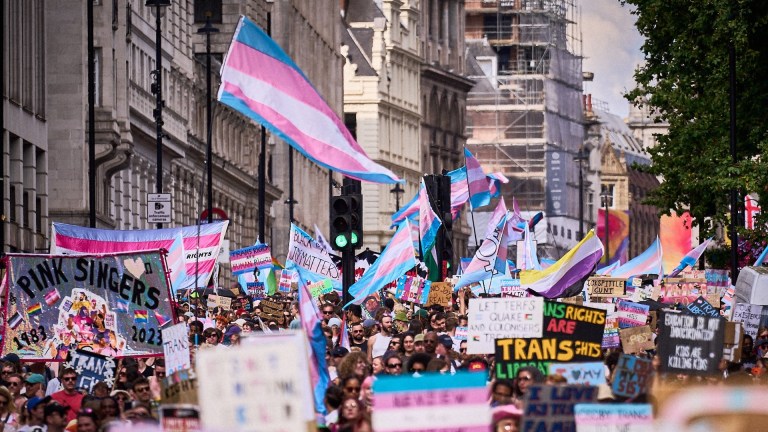The evidence shows that we would all make the same decisions if we were living without money.
The assumption there is the same – they both assume that there is something wrong with the poor themselves. There is now some really exciting new evidence that shows poverty is really just about the context. Yes, it’s true that if you’re poor you are more likely to make poor decisions – you smoke more, drink more, raise your kids worse, take out more loans you can’t afford. But the evidence shows that we would all make the same decisions if we were living without money. If you lift people out of poverty then they start making much smarter decisions.
Isn’t that what the welfare state is there for?
There is some truth in the conservative criticism of the welfare state as we have it now, we must admit that. So often the welfare state can be incredibly bureaucratic and paternalistic. And there’s the issue of the poverty trap, where people lose their benefits and are worse off because they start working. In many cases around the world the welfare state as we have it right now can trap people at the bottom rather than act as a trampoline for them to bounce up.
And that’s why I love this idea of a guaranteed basic income. It’s unconditional. It’s a floor you can always stand up on. You can earn money to supplement it of course – but you can always fall back on the basic income if you need.
How would that impact upon people’s drive to succeed?
It simply gives people the freedom to choose what they want to do. Look at the British bands from the Sixties like The Beatles and the Stones. Not many people talk about the fact that they were on the dole which is how they could afford the time to come up with ideas and create this wonderful music. UB40 even named themselves after the unemployment benefit form.
Advertising helps fund Big Issue’s mission to end poverty
We wouldn’t have all of this wonderful music without the support of society and the state. This is how universal basic income should function as well. Give people the freedom to decide for themselves what they want to make of their life – go to a different job, move to a different city, start their own company, make music make art, whatever.
This is exactly the sort of stuff that would make people on the right hostile to the idea. How can you convince them that we need to produce more pop bands?
If you don’t have a heart you still have a wallet.
Because it’s not just the right thing to do but also the financially smart thing to do. If you don’t have a heart you still have a wallet. It actually saves you money. There was a small experiment in London with 13 homeless men and they received £3k each as personal budget to spend how they wanted to. A lot of people were very sceptical of that experiment.
But a year later nine of the 13 had a roof above their house, two more had applied for housing and it actually saved everyone a lot of money. The experiment cost £50,000 in total and probably saved society hundreds of thousands in all the associated costs of those men remaining homeless.
If we start taxing companies and the super-rich, won’t they just move to other countries and take all their jobs with them?
I think that’s like living in the 17th century and saying: “Let’s abolish piracy because pirates are murderers and rapists.” And people saying, “We can’t because then the crews would lose their jobs.” So, we need to really think about who the real wealth creators are in our society.
Advertising helps fund Big Issue’s mission to end poverty
Who are the real wealth creators?
There is some really interesting research on what they call socially useless jobs. Economists have asked people around the globe, “Do you think your job is useful to society?” Twenty-five per cent of people in the modern workforce say they are doubtful that their jobs contribute to the common good. These people tend to be corporate lawyers, consultants, CEOs.
There are four times as many people who think their jobs are useless in the private sector than in the public sector. Which goes against the usual narrative of the private sector being so entrepreneurial and creative and the public sector being so wasteful.
So, should we go back to big government? That didn’t work out so well in the Seventies.
Yes, but in the Fifties and Sixties, the golden age of capitalism, the UK and the US had the highest growth rates and highest innovation levels in modern times and also the highest top-rate taxes. People would laugh now at idea of 90 per cent top rate marginal taxation. They had it in the US under Eisenhower who was a Republican president!
You’ve been accused of being a communist. How would you describe your politics?
Advertising helps fund Big Issue’s mission to end poverty
I am a traditional social democrat. I believe in managing capitalism because it has a tendency to get out of balance. Basic income guarantee has a strong tradition among social democrats. At the end of the Sixties in the US almost everyone expected that some form of universal basic income was going to be implemented.
It was actually Richard Nixon who almost implemented it at the beginning of the Seventies and the Democrats voted against it because they thought it should have been higher. There was a bill for basic income that got through the House of Representatives twice and would’ve given a basic income to 10 million working poor in America. It would’ve been such a revolutionary change in the whole welfare state.
Can politicians actually bring about this sort of radical change?
In most cases politicians are at the end of the line – real change always starts at the fringes by people who are first dismissed as unreasonable radicals with their impossible dreams. And then they start moving towards the centre.
To me it has been quite incredible to start writing about this idea of a basic income six years ago when it was a totally forgotten idea that was dismissed as a communist fantasy. Now I am being invited to Davos to talk about it! Suddenly so many elites were interested in the idea and realising that actually maybe we do need to start moving in that direction.
Advertising helps fund Big Issue’s mission to end poverty
You seem very laid back. What made you become so confrontational at Davos and on Tucker Carlson’s show?
Tucker Carlson wanted to use me. Let’s be clear on that. He saw my performance at Davos. He liked the fact that I stood up to these liberal billionaires, the Jeff Bezoses of the world, who tell their stories about philanthropy and meanwhile they’re not paying their taxes. So, he was thinking he could use this Dutch historian to help prove that all these liberals were hypocrites.
If bin collectors go on strike then we all have big problems. If bankers strike, nothing much happens.
I knew that’s what he wanted to do. But I’m just not much of a fan of millionaires who are paid by billionaires to scare people about immigrants. I didn’t expect him to get so angry about that. Apparently, I touched a nerve.
Some people think you fundamentally misjudge human nature – don’t we all like to see people earn what they deserve?
I agree that most people do believe in meritocracy but that’s exactly what I am arguing for here. Bin collectors should get paid more than bankers because they contribute more. If bin collectors go on strike then we all have big problems. If bankers strike, nothing much happens.
But don’t we all want to get ahead?
Advertising helps fund Big Issue’s mission to end poverty
I think that is tied to the one big fallacy in British thinking: that human beings are by nature competitive. You’ve always had this survival of the fittest idea going on in Britain. So many of your institutions revolve around that – your democracy, your boarding schools, everything is about assuming that most people are selfish and need to compete against each other.
All the evidence from the worlds of biology, psychology, anthropology and economics has converged in the past 15 years to suggest that humans are more naturally geared towards empathy and co-operation. It is more natural for humans to be nice to each other. We actually have a very deep need to connect with other people.
Utopia for Realists: And How We Can Get There is out now (Bloomsbury, £8.99)










